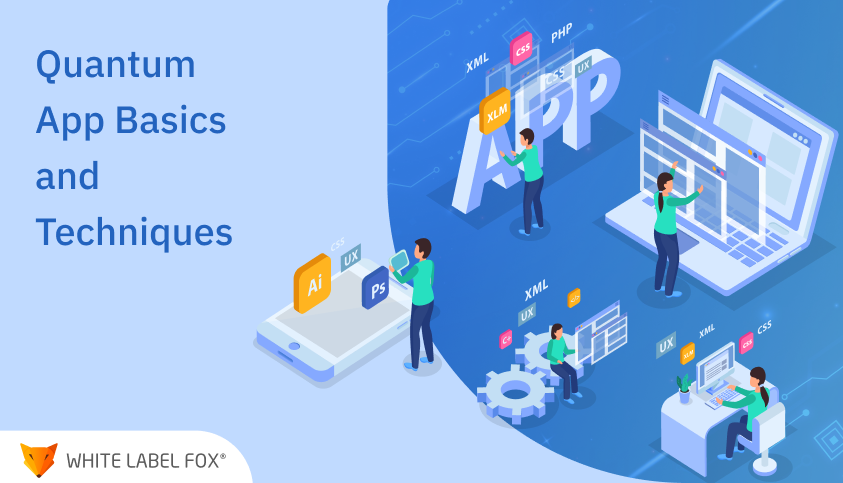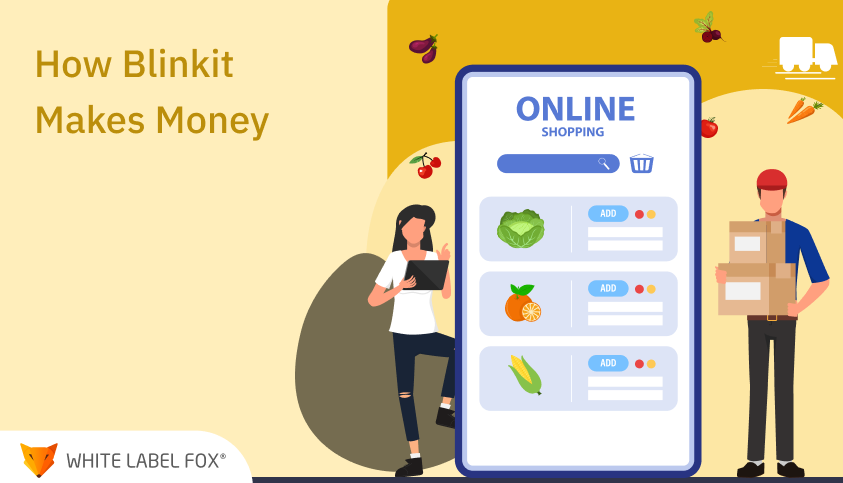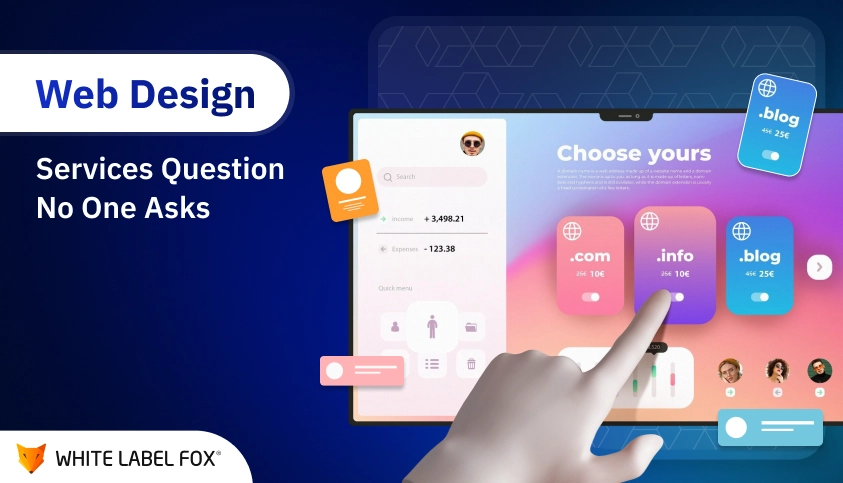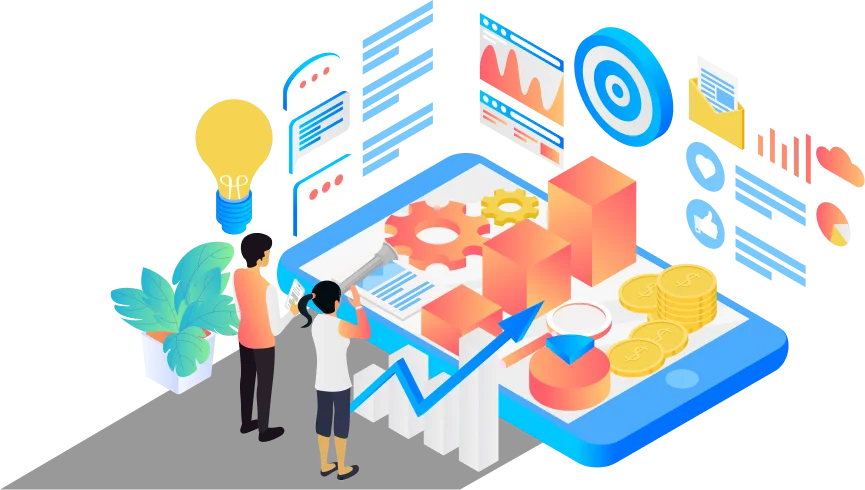When we talk about next-generation technology, Quantum computing grabs the spotlight. Top industry players like finance services, agriculture, and more are waiting to leverage its full potential. As quantum computers begin to move from theory to the practical, it’s no surprise that quantum app development is the next step for businesses to take.
Many are investing in the applications of quantum technology to solve complex problems. Quantum software development is in its early stages, but the potential is immense. A deep understanding of key principles of quantum computing, quantum frameworks and tools, algorithms, and more can help to develop the immense apps of tomorrow. Read this quantum app development tutorial to have deep insight into the topic.
What is a Quantum Computer?
A computer that uses quantum mechanical phenomena is a Quantum computer. This computation varies from classical computers as it doesn’t use classical bits (0 or 1), instead, it uses qubits or quantum bits. Quantum phenomena include:
- Superposition;
- Entanglement.
This phenomenon enables quantum computers to solve problems faster by processing data parallelly. Quantum computers perform physical simulations by breaking widely used aid physicists and encryption schemes.
What are Quantum Algorithms?
A procedure that enables quantum computers to perform calculations quickly is quantum algorithm design. It can be categorized by speedup achieved type over corresponding classical algorithms. Quantum algorithms depend on the quantum Fourier transform primitive. It emerged to solve Deutsch’s algorithm, oracle problems, Simon’s algorithm, and Bernstein–Vazirani algorithm.
Quantum algorithms can’t solve practical problems but are demonstrated mathematically. It helps engineers, developers, and more to gain information by querying a black box with a quantum state in superposition also termed quantum parallelism.
In short, quantum algorithms use unique properties of quantum computing like interfaces, superposition, and more. Some of the known quantum algorithms are as follows:
- Shor’s Algorithm
- Grover’s Algorithm
- Quantum Fourier Transform (QFT)
What is Quantum Computing?
An advanced form of computing that uses quantum mechanics to decode difficult issues in ways that classical computers can’t is termed quantum computing. It spans multiple areas and has become an essential part of the technological landscape.
According to Fortune Business Insights, the global market for quantum computing is estimated to grow and reach $12,620 by 2032, however, the market was measured at $1,160 million in 2024. It experiences 34% growth during the forecasted period. The North American region dominated the global market with a share of 43.86% in 2023.
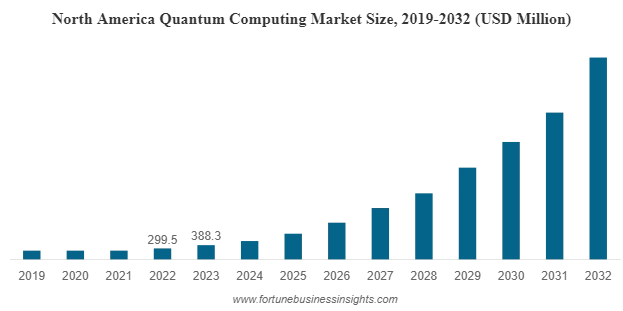
Source:
Fortune Business InsightsKey Principles of Quantum Computing
Superposition
When we talk about key principles of quantum computing, how we can miss superpositions. Compared to a classical bit that exists in (0 or 1), Qubits (quantum bits) exist in multiple states simultaneously. This enables quantum computers to process wider data parallelly, making them powerful for computation types.
Entanglement
A quantum phenomenon where two or more qubits become correlated in such a way that each qubit state depends on another is entanglement.
Entanglement enables qubits to work together, which means a change to one qubit will affect its entangled partner even though it’s far away. Entangled qubits can be used for quantum teleportation, that is quantum cryptography. It ensures massive speedup in computational capabilities.
Quantum Interference
In quantum computing, the interface helps Grover’s search algorithm and others to solve problems quickly. The Quantum interface increases the right answer as it occurs when qubit states overlap.
Quantum Measurement
The process in which a qubit crumples into a precise state (0 or 1) is quantum measurement. Before this, the quantum state (qubit) exists in a superposition of both 0 and 1. This key principle of quantum computing reflects the primary difference between quantum and classical systems. Ensure measurements don’t destroy valuable quantum details prematurely by designing the algorithms carefully.
Quantum Gates and Circuits
Similar to classical logic gates designed to manipulate qubits using superposition and entanglement principles are termed as quantum gates. Quantum gates execute diverse functions on qubits including:
- States flipping,
- Entangling qubits,
- Creating superpositions.
Common Quantum Gates:
- Hadamard Gate (H)
- Pauli-X Gate
- CNOT Gate (Controlled NOT)
Multiple qubits and gates working together to execute algorithms are what we call quantum circuits. These quantum circuits enable computers to manipulate information in a way that classical computers can’t.
Quantum Decoherence and Error Correction
Error caused in quantum computation due to external factors like electromagnetic fields and temperature changes is what we term quantum decoherence.
Want to leverage the power of quantum computing?
No worries, contact the White Label Fox team today!
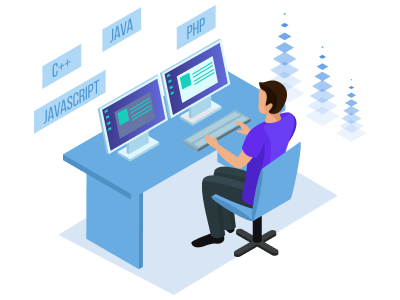
Quantum Speedup
The quantum computers’ potential to solve certain problems faster than classical computers -Quantum Speedup. Quantum algorithms help to solve specific problems such as searching unstructured data in less time compared to classical algorithms.
Some quantum algorithms provide exponential speedups while others provide polynomial speedups. In both types, quantum computers provide substantial benefits over classical machines for particular problems.
Quantum App Development Tutorial: Everything Explained!
The software development industry is adapting to changing trends and technologies, and quantum computing is one of them.
Applications of quantum technology are taking the software industry by storm. Its processing speed enables app developers to develop digitized apps effectively. There are lots of quantum app development tutorials out there that explain its frameworks, tools, technology, and more to developers, but each lacks some or other information.
In this article on quantum app development, we’ve tried to cover everything. From what quantum computing is, its principles, what is quantum app development, the tools and frameworks to use, the future of quantum computing, and more. Let’s begin our journey!
What is Quantum App Development?
The use of quantum technology to develop applications that operate on smart devices is Quantum app development. Computational power helps to solve complex problems, and advanced functionalities of Quantum apps process significant information or business flows faster through improved computing ability.
Computing based on quantum principles boosts faster calculations. Special quantum programming languages including Qickit or Cisq are used to develop innovative apps that have great potential and are operational across various industries.
Types of Quantum App Development
Developers are using applications of quantum technology to develop various types of apps. These applications rely on the key principles of quantum mechanics and process information in different manners. Let’s explore a few Quantum app development types, including:
- Quantum Annealing
- Universal Quantum Computing
- Analog Quantum Simulations
- Quantum Algorithm Development
- Quantum Machine Learning (QML)
- Quantum Simulation
- Quantum Cryptography
- Quantum Optimization
- Hybrid Quantum-Classical Computing
- Quantum Cloud Development
- Quantum Error Correction and Noise Reduction
- Quantum Financial Models
Although quantum software development is in an earlier stage, it has revolutionized many industries. Industry leaders use different types of app development to solve complex problems faster.
Benefits of Developing Quantum Applications
“If you aren’t confused by quantum algorithms and mechanics, you don’t apprehend it” ~John Wheeler
It’s well said that quantum mechanics is very complex to understand, but provides lots of advantages when used for developing quantum applications. What benefits can you leverage for your businesses with quantum software development? We’ve listed a few for you:
- Enhanced Processing Power
- Improved Speed
- Highly Secured
- Accurate Results
- More Productivity
- Affordable Method
- Better Execution of Algorithms
- Faster Performance
- Reduced Costs
Quantum Software Development Challenges
Despite quantum software development benefits, various challenges come with it due to its complete quantum computing nature. Various challenges that come with developing quantum applications include:
- Security Breach Risks
- Increased Complexity
- Lack of enough quantum programming expertise
- Lack Of Standardization and Protocols
- Resource and Cost Constraints
- Hardware Limitations
- Quantum Algorithm Complexity
- Limited Software Tools and Ecosystem
- Quantum Error Correction
- Performance Uncertainty
- Uncertain Commercial Viability
Launch Your Quantum App Today!
Hire Our Quantum App Developers to Bring Your Vision to Reality!
Top Quantum Frameworks and Tools to Use for Application Development
Developers can use a quantum app to resolve any problem accurately. To leverage its power, it’s essential to use top quantum frameworks and tools for mobile app development.
Many open-source quantum app development tools available out there can fulfill different requirements of developers. Let’s discuss some of the top quantum frameworks and tools to use for quantum application development.
Cirq
Developed by the Google AI Quantum Team, Cirq is an open-source framework. The Cirq simulator was used by QC to show a demo of implementing QAOA to solve problems. This quantum framework is simply utilized to develop circuits when run against quantum computers.
“Quantum Circuit” is an effective program of Cirq, which was invented by the “Moments” series defending gates that must be operated at the same time. This library works to expose information about NISQ (Noisy Intermediate-Scale Quantum) hardware, ensuring it can be run on a physical quantum computer.
Cirq provides interoperability functions. For example, importing and exporting functions for quantum simulations. One can use quantum circuits for algorithms including:
- QAOA;
- Variational algorithms.
Starting with a simple quantum app such as “Quantum Walk” is also a wiser choice to make.
Q-CTRL Python Open Controls
It’s an open-source Python package that provides a comprehensive library to deploy error-robust quantum control protocols. Q-CTRL Python Open Controls is developed by Australian quantum startup Q-CTRL to provide a comprehensive library to publish and test quantum techniques.
The Q-CTRL Open Controls Python package delivers a comprehensive library of tested error-robust quantum control protocols. The easy-to-export function of this Python package enables individuals to build controls on the Q-CTRL products suite, custom quantum hardware, and cloud quantum computers.
Quantum Development Kit & Q#
Q# is integrated into the Quantum Development Kit (QDK) by Microsoft, which always tries to stay forward with its outstanding moves in this tech-savvy world. Q# also termed “Q-sharp” is a free-to-use or open-source language for generating quantum algorithms.
Q# makes it easier for quantum programmers to simulate solutions that require around 30 qubits. It helps them stay familiar with classical programming paradigms. This quantum programming language has a more vertical learning curve compared to the Python-based languages including the Qiskit and Cirq. Integrating Q# with Visual Studio provides you with a seamless development experience.
Strawberry Fields
Powered by Xanadu, Strawberry Fields is a built-in tool to simulate and compile programs for our range of quantum photonic processors. This cross-platform Python library provides developers with great functionalities that help them to solve practical problems, including:
- Graph and network optimization,
- Chemistry,
- Machine learning.
Strawberry Fields in short is a complete package for quantum app development as it helps programmers to information by using the photons as qubits. Using this quantum programming language provides advantages like:
- Low error, and
- Long coherence times.
ProjectQ
NCCR-QSIT ETH is an open-source effort for quantum computing. It features a compilation framework qualified for targeting diverse hardware types.
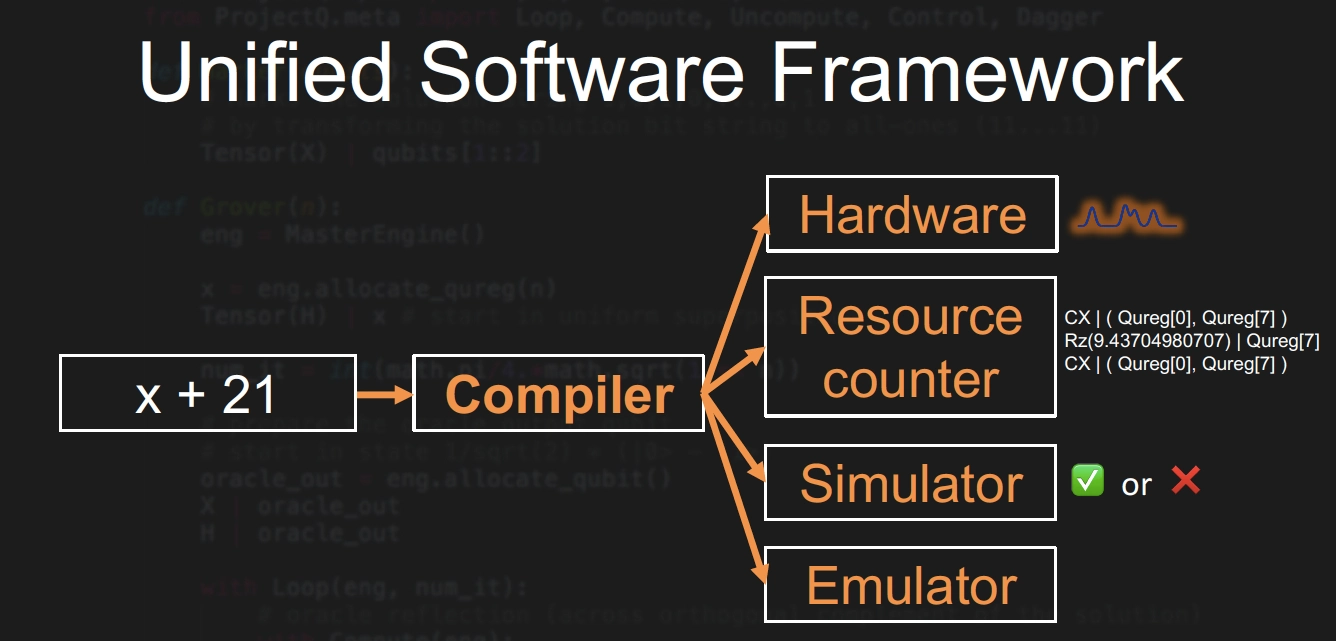
Source:
(NCCR-QSIT ETH)This is one of the best quantum programming languages that enables programmers to implement their programs in Python using intuitive syntax. This output is then translated to back-end language type, be it a simulator operated on a chip or a simulator including the IBM Quantum Experience platform.
Quantum App Development Use Cases to Look into!
Various industries are leveraging the potential of quantum app development by solving problems that classical computers find difficult or impossible to address. Below are a few applications of quantum technology use cases to look into, these include:
- Drug Discovery and Molecular Simulation
- High-Performance Computing (HPC) Enhancements
- Optimization Problems
- Financial Services and Risk Management
- Quantum Cryptography and Secure Communications
- Autonomous Vehicles and Traffic Optimization
- Climate Modeling and Environmental Science
- Materials Science and Engineering
- Healthcare and Personalized Medicine
- Energy Sector and Power Grid Optimization
- Quantum Internet and Distributed Quantum Computing
- Gaming and Entertainment
Above are a few potential quantum application developments that grow continually, enabling breakthroughs across a wide range of fields.
What is the Future of Quantum Computing and App Development?
The future of quantum computing and app development holds great potential but also has significant challenges. Quantum computing will operate in the NISQ (Noisy Intermediate-Scale Quantum) era in the next few years, where hybrid quantum-classical systems will address specific problems.
Different Industries will benefit from early quantum computing applications. With cloud-based quantum services including Quantum-as-a-Service (QaaS) make the quantum tools accessible for coders for Quantum app development. Feature-rich applications of quantum technology disrupt industries from healthcare to finance which create new fields of innovation.
Quantum computing’s growth reshapes industries and unlocks new opportunities in app development. In the long term, error-corrected quantum computers and new business models, present new ethical and security challenges. Quantum computing and app development drive a new era of research and inventions.
Why White Label Fox for Quantum App Development Services?
The quantum app development industry is transforming at an unprecedented speed. New trends are now shaping the industry. As a result, many enterprises embrace digital transformation through their operation methodologies within an organization setup.
If you’re in search of quantum app development services, White Label Fox is an excellent choice. We have a team of experts who have experience in delivering customizable solutions that meet the unique quantum app development demands. We help businesses leverage quantum technology to build powerful applications that can handle complex computations and deliver prominent performance.
Additionally, we believe in supporting businesses through their entire development journey. Contact us today to discuss your project idea at [email protected]!
Frequently Ask Questions
Quantum app development refers to the process of building applications
that leverage the principles of quantum computing. These apps utilize
quantum bits (qubits) and quantum algorithms to solve complex problems
much faster than traditional classical computing methods. Quantum apps
are still in the early stages of development but hold promise for fields
like cryptography, optimization, and artificial intelligence.
Quantum algorithms are designed to exploit the unique properties of
quantum computing, such as superposition and entanglement, to perform
specific tasks more efficiently than classical algorithms. Notable
quantum algorithms include Shor’s algorithm for factoring large numbers
and Grover’s algorithm for searching databases, both of which have
significant implications for fields like cryptography and data science.
Quantum app development typically involves specialized programming
languages that support quantum computing principles. Popular languages
include:
- Qiskit (Python-based library for quantum computing by
IBM)
- Cirq (Python library by Google)
- Quipper (Functional programming language for quantum
computing)
- Microsoft Quantum Development Kit (including Q# language)
These languages allow developers to work with quantum circuits,
algorithms, and quantum gates.
- Qiskit (Python-based library for quantum computing by IBM)
- Cirq (Python library by Google)
- Quipper (Functional programming language for quantum computing)
- Microsoft Quantum Development Kit (including Q# language) These languages allow developers to work with quantum circuits, algorithms, and quantum gates.
The key concepts in quantum app development include:
- Superposition: A qubit can exist in multiple states at
once.
- Entanglement: Qubits can be correlated such that the
state of one qubit affects the state of another, even at great
distances.
- Quantum Gates: Operations that manipulate qubits to
perform calculations.
- Quantum Circuits: A sequence of quantum gates applied to
qubits to perform a task. These concepts form the foundation of
quantum algorithms and applications.
- Superposition: A qubit can exist in multiple states at once.
- Entanglement: Qubits can be correlated such that the state of one qubit affects the state of another, even at great distances.
- Quantum Gates: Operations that manipulate qubits to perform calculations.
- Quantum Circuits: A sequence of quantum gates applied to qubits to perform a task. These concepts form the foundation of quantum algorithms and applications.
Quantum app development faces several challenges:
- Quantum Hardware Limitations: Quantum computers are still
in the early stages, with limited qubits and error rates.
- Quantum Decoherence: Qubits lose their quantum state when
interacting with their environment, which makes it difficult to
maintain the integrity of quantum calculations.
- Complexity in Programming: Writing efficient quantum
algorithms requires specialized knowledge and understanding of
quantum physics. Despite these challenges, advancements in
quantum hardware and software are continuously improving the
development process.
- Quantum Hardware Limitations: Quantum computers are still in the early stages, with limited qubits and error rates.
- Quantum Decoherence: Qubits lose their quantum state when interacting with their environment, which makes it difficult to maintain the integrity of quantum calculations.
- Complexity in Programming: Writing efficient quantum algorithms requires specialized knowledge and understanding of quantum physics. Despite these challenges, advancements in quantum hardware and software are continuously improving the development process.
Quantum apps have the potential to revolutionize various industries,
including:
- Cryptography: Quantum computers can break traditional
encryption methods, leading to the development of
quantum-resistant encryption algorithms.
- Optimization: Quantum algorithms can solve complex
optimization problems, such as supply chain management and
financial portfolio optimization.
- Machine Learning: Quantum computing can accelerate
machine learning algorithms, improving AI capabilities.
- Drug Discovery: Quantum computers can simulate molecular
interactions at a much faster rate, helping with drug
development. These applications have the potential to change the
way industries operate.
- Cryptography: Quantum computers can break traditional encryption methods, leading to the development of quantum-resistant encryption algorithms.
- Optimization: Quantum algorithms can solve complex optimization problems, such as supply chain management and financial portfolio optimization.
- Machine Learning: Quantum computing can accelerate machine learning algorithms, improving AI capabilities.
- Drug Discovery: Quantum computers can simulate molecular interactions at a much faster rate, helping with drug development. These applications have the potential to change the way industries operate.
Testing and debugging quantum apps is a complex process due to the
probabilistic nature of quantum computing. Developers often simulate
quantum algorithms on classical computers using quantum software
frameworks before running them on actual quantum hardware. Quantum
simulators, like IBM’s Qiskit Aer or Microsoft’s Quantum
Development Kit, help developers test their algorithms and
understand their behavior in various scenarios. However, debugging
quantum apps is still an evolving field.
Several platforms provide cloud-based quantum computing environments
that developers can use for app development. Some popular platforms
include:
- IBM Quantum Experience (provides access to IBM’s quantum
computers via the cloud)
- Google Quantum AI (offers quantum computing services
through Cirq and quantum hardware)
- Microsoft Azure Quantum (provides quantum computing
services and integration tools)
- Amazon Braket (AWS quantum computing service) These
platforms offer quantum processors, simulators, and development
tools to build and test quantum apps.
- IBM Quantum Experience (provides access to IBM’s quantum computers via the cloud)
- Google Quantum AI (offers quantum computing services through Cirq and quantum hardware)
- Microsoft Azure Quantum (provides quantum computing services and integration tools)
- Amazon Braket (AWS quantum computing service) These platforms offer quantum processors, simulators, and development tools to build and test quantum apps.

